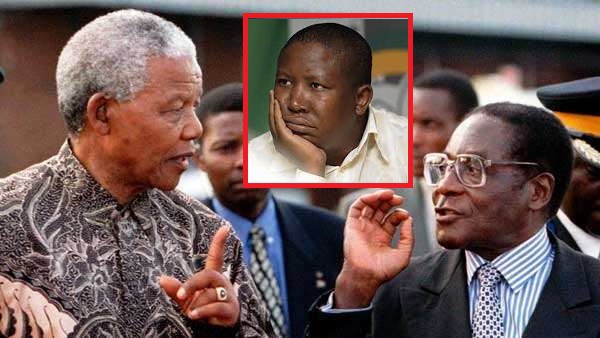By Robert J. Traydon
Julius Malema is one of South Africa’s most contentious leaders. However, people should be slow to write him off as a political extremist. The fact is, Malema is at a crossroads: will he choose to follow in the footsteps of Nelson Mandela or Robert Mugabe?
Malema has been labelled a firebrand, a racist and an extremist, but there’s one thing few people can deny: he’s come a long way since his days as the ANC Youth League leader.
In fact, subsequent to him being expelled from the ANC in April 2012, he launched his own political party, the Economic Freedom Fighters (EFF), which won 6% of the national vote in the 2014 general election and 25 seats in the National Assembly. As an MP, Malema made his mark as one of Parliament’s most vociferous critics of President Jacob Zuma and the ANC government for their mismanagement of state resources.
In the 2016 municipal elections, Malema’s party won 8% of the national vote and, through various coalitions with the Democratic Alliance (DA) and other political parties, now has seats in major metros and numerous other municipalities. Over and above these political achievements, Malema graduated with a BA degree from Unisa in March 2016.
Malema the ‘Mandela’
Seeing how Malema has matured over the last decade reminds me a lot of Mandela’s own ‘long walk to freedom’. Mandela was also a firebrand in his younger days, advocating many of the same economic policies Malema is calling for today. As young men, they shared the same incredible charisma that appealed to people across our population, especially those from disadvantaged backgrounds.
Looking at Mandela when he was released from prison and led South Africa towards a non-racial democracy, he had matured from a young firebrand into a father of the nation. Malema has the potential to walk the same path Mandela did: to become a revered leader who seeks only one thing, a united, non-racial South Africa where widespread poverty is eliminated through quality education and inclusive economic growth.
Malema the ‘Mugabe’
But, Malema could equally end up following in the footsteps of the former president of Zimbabwe, Robert Mugabe. Malema has long been outspoken in his praise for comrade Mugabe, especially his anti-imperialism stance, the controversial land reform programme started in 2000, his indigenisation policies, and his nationalisation ambitions for the mining and banking sectors.
Another concerning attribute Malema shares with Mugabe is his occasional racist rants. Both appear to harbour deep-rooted animosity towards white people, even after Zimbabwe gained independence in 1980 and South Africa transitioned to democracy in 1994.
How Malema interpreted the ousting of Mugabe would make for fascinating reading – the ‘God-like’ man he had worshipped for so long, unceremoniously pushed aside by his compatriots, castigated by his people, and then witnessing so many of his regressive political and economic policies being scrapped without a second’s thought by the new ZANU-PF administration.
It may have come as a big surprise for Malema to see just how unpopular Mugabe had become despite him having implemented so many supposedly ‘populist’ policies.
Malema’s political junction
So, Malema finds himself in a very difficult situation. He’s won 8% of the vote largely as a result of his calls for land expropriation and nationalisation. If he were to soften his views as Mandela did, he risks being viewed as a sell-out by the majority of his current voters; but, if he continues along his Mugabe-like warpath, he risks not growing the EFF into a party that could one day rule South Africa outright.
Not an easy decision for any young, aspiring politician. To help him, though, he should ask himself the following:
Do I want to be remembered like Mugabe: a man who divided his people with persistent racism, destroyed his country with failed economic policies, and caused widespread unemployment, hunger and poverty?
Or, do I want to be remembered like Mandela: one of the greatest people who ever lived, a man who promoted reconciliation, united a nation, and created a political climate that focused on South Africa becoming a winning nation?
– Robert J. Traydon is a BSc graduate of Engineering and the author of ‘Wake-up Call: 2035’. He’s travelled to over 40 countries across six continents and worked in various business spheres. His articles explore a wide range of controversial subjects and current affairs from a uniquely contrarian perspective.
